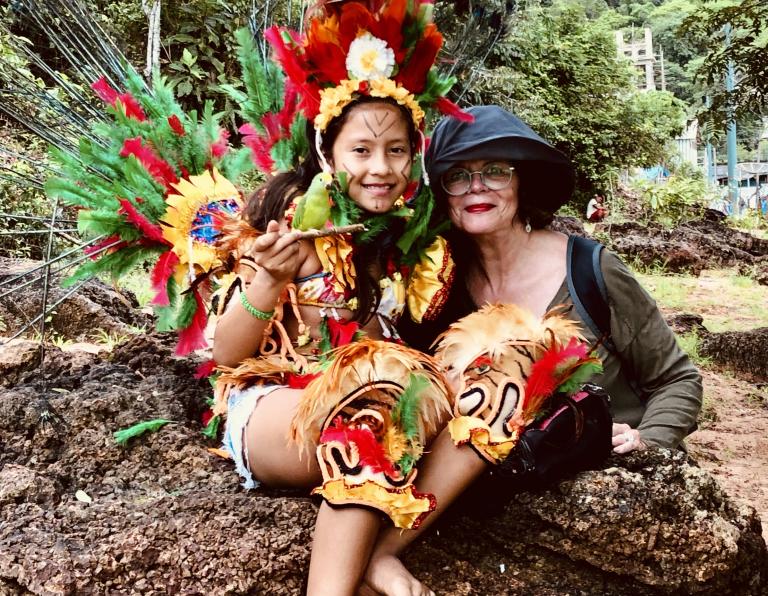Do we need God when all our “needs” are met? Do we need God when we no longer operate out of an economy of scarcity or of a need to appeal an all-powerful deity to stay alive? Do we need God when food is plentiful, the weather always predictable?
 It’s a rainy Amazonian morning. I am sitting on our deck, a few raindrops hitting my feet, and thinking about the last few days on this trip.
It’s a rainy Amazonian morning. I am sitting on our deck, a few raindrops hitting my feet, and thinking about the last few days on this trip.
We’ve been able to visit a few places where, although there are no “untouched” people groups on these accessible rivers, we have seen a bit of how people used to live and had some minimal interaction with them. I’ve also been attending lectures and reading like crazy to gain a better understanding of what we are seeing and experiencing here.
The big question . . .
Do we need God when all our “needs” are met? Do we need God when food is plentiful, the weather always predictable, where there is little illness (possibly because of a high infant mortality rate, leaving only the strongest to survive), no adolescence, warfare is mostly ritualistic or non-existent, and death received as a natural part of life and so approached without fear?
Such is (or was before the missionary microbes or rapacious colonists killed most of them) life for the indigenous people who have long inhabited the area of the world known as the Amazon Rain Forest.
It’s different in the modern world
But life hits differently for we modern folk.
Consider the prayer requests that pepper our conversations, our social media posts, and the “joys and concerns” sections of various church gatherings: they tend to focus on illness, impending death and sorrow, the weather (praying either for or against rain along with protection from destructive weather events like floods and tornadoes), wayward children, and finances.
The major prayer for both Christians and Jews seeks provision of daily bread—totally relevant in a world always on the verge of famine and mass starvation but irrelevant when food is freely available for those with intimate knowledge of the rainforest.
As for our wayward teens and young adults . . .believe it or not, there are societies where children are handed what we see as adult responsibilities very early in life. Consider small children learning to handle knives competently. This is normal in many parts of the less-developed world.
I’m writing these questions after doing a fair amount of reading about the nature of life among hunter-gatherer societies. One of the best, and a fairly recent one, is James Suzmans’s compelling read, Affluence without Abundance.” Another older one is Daniel Everett’s memoir of being a translator/missionary to a remote tribe, “Don’t Sleep: There Are Snakes.” The first speaks of the remains of hunter-gatherer societies in Namibia, Africa; the second of indigenous people in the Amazon river basin.
The managing of life by hunter-gatherer societies has existed for probably 250,000 years with remarkable stability. It is rapidly disappearing now although there are certainly some very much protected peoples around the world.
But once people learned to grow crops and to herd food-producing animals–possible only in certain favorable geographical areas–two things happened. First, rose a need to settle in one place to watch over those food sources. Hunter-gatherers travel constantly. Second, suddenly there was extra food—more than could be gathered in one day. That food had to be preserved and stored rather than eaten immediately before it spoiled.
With more abundant provisions and decent food storage technologies, fewer people would need to devote all their time to food acquisition. Others could invest energy in different things. Also, with settlement came the need for more “stuff” than is necessary for people constantly on the move–in particular more effective food producing machines and storage options.
An older but helpfully informative book by Jared Diamond, Guns, Germs and Steel, helps to set out the timeline on how all this happened.
When these ills are not present . . .
But to return to my question: when the ills that plague all civilized societies are not present, what happens to the need for an all-powerful God who demands sacrifices of some sort to be appeased and to show favor on humankind? Like it or not, that is the dominant, but not necessarily the most accurate, message of much current Christian thought.
Ancient religious practices undoubtedly influenced this understanding: God can’t save us or give us food unless some blood, preferably innocent blood, has covered us. Again, this type of narrative, i.e., the blood sacrifice, has commonality in many of the world’s religions.
But what if . . . ? What if so much of our theology depends on the economics and politics of scarcity? Scarcity of power, of health care, of security, of love, of the essentials of life?
What happens when those fears of “I won’t have enough . . . ” are not present.
What if, “I have enough and don’t need more” underlies the societal system?
What if shared, not hoarded, power is the norm? Where we don’t see a “chief” in the sense that Westerners understand it and no one has more of anything than anyone else?
Yeah, it sounds a bit like Eden, a place without fear–the inevitable love-destroyer–but it’s a decent description of how classical hunter-gatherer societies work.
The entire village does help care for the children who, again, are not children in our sense of the world but gain a great deal of independence early in life. There’s an awareness that sometimes couplings don’t work and a free exit from them.
Food sources are readily available IF the knowledge of the mysteries of the rainforest–places of certain death to the ignorant–is faithfully handed from generation to generation.
In tropical groups, the people are literally “naked and not ashamed” and for a good reason. Frankly, clothes are a terrible idea in the steamy rainforest with its months-long rainy season. Also, indigenous people in the vast Amazonian rainforest all live near one of the many, many rivers, They are in and out of the water all the time as fish has long been the mainstay of their exceedingly healthy diets. Fabric clothes, which never dry out here, are a hindrance, not a help.
I don’t have answers to my questions, but I still feel the need to write them out. It’s all part of my attempt to re-think Christianity and Christian practice in a way that makes sense in a world not dominated by a modern/western mindset.
Photo by Christy Thomas, taken with permission at Boca de Valeria, on the Amazon River; © December 2018. All rights reserved.













